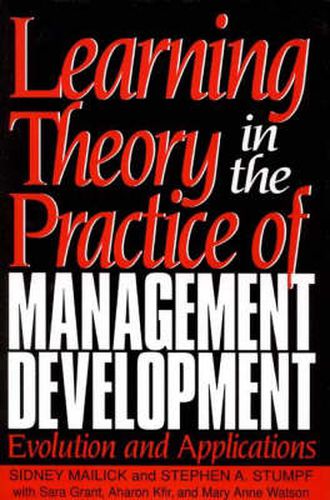Readings Newsletter
Become a Readings Member to make your shopping experience even easier.
Sign in or sign up for free!
You’re not far away from qualifying for FREE standard shipping within Australia
You’ve qualified for FREE standard shipping within Australia
The cart is loading…






The workplace is the ideal environment for tying together management theory and practice and yet, classes in many regular management development programs are conducted away from the work site, and class sizes are so large that individual instruction is difficult to achieve. In this book, the authors seek effective ways to merge theory with workplace practice, and advocate the modular preceptor method whereby participants work together in dyads and triads with a preceptor acting as advisor and instructor. Unlike traditional management development programs which do not usually lead to behavior changes, the modular preceptor model has behavior change as the basic aim. Participants can remain at work while experiencing individualized learning, developing problem solving skills, and acquiring new knowledge which can be immediately applied to work situations.
Various ways of learning, such as passive (lecture, case study, discussion) and experiential (role playing, games, sensitivity training) are examined. No single mode of learning can be comprehensive and adequate for all situations. The authors contend, however, that experiential learning is most effective for increasing the will and competence to learn and for using what is learned to change manager behavior. The purpose of the modular preceptor approach is not to present answers to specific managerial or organizational problems, but to help the participant acquire new problem definition and problem solving skills, and the confidence to apply them on the job. This book also analyzes the contribution of the behavioral sciences to the philosophies and techniques behind management instruction, and examines the role of the university in management development and the future direction of MBA programs. For anyone concerned with meaningful and effective management development, this book is an invaluable resource.
$9.00 standard shipping within Australia
FREE standard shipping within Australia for orders over $100.00
Express & International shipping calculated at checkout
The workplace is the ideal environment for tying together management theory and practice and yet, classes in many regular management development programs are conducted away from the work site, and class sizes are so large that individual instruction is difficult to achieve. In this book, the authors seek effective ways to merge theory with workplace practice, and advocate the modular preceptor method whereby participants work together in dyads and triads with a preceptor acting as advisor and instructor. Unlike traditional management development programs which do not usually lead to behavior changes, the modular preceptor model has behavior change as the basic aim. Participants can remain at work while experiencing individualized learning, developing problem solving skills, and acquiring new knowledge which can be immediately applied to work situations.
Various ways of learning, such as passive (lecture, case study, discussion) and experiential (role playing, games, sensitivity training) are examined. No single mode of learning can be comprehensive and adequate for all situations. The authors contend, however, that experiential learning is most effective for increasing the will and competence to learn and for using what is learned to change manager behavior. The purpose of the modular preceptor approach is not to present answers to specific managerial or organizational problems, but to help the participant acquire new problem definition and problem solving skills, and the confidence to apply them on the job. This book also analyzes the contribution of the behavioral sciences to the philosophies and techniques behind management instruction, and examines the role of the university in management development and the future direction of MBA programs. For anyone concerned with meaningful and effective management development, this book is an invaluable resource.